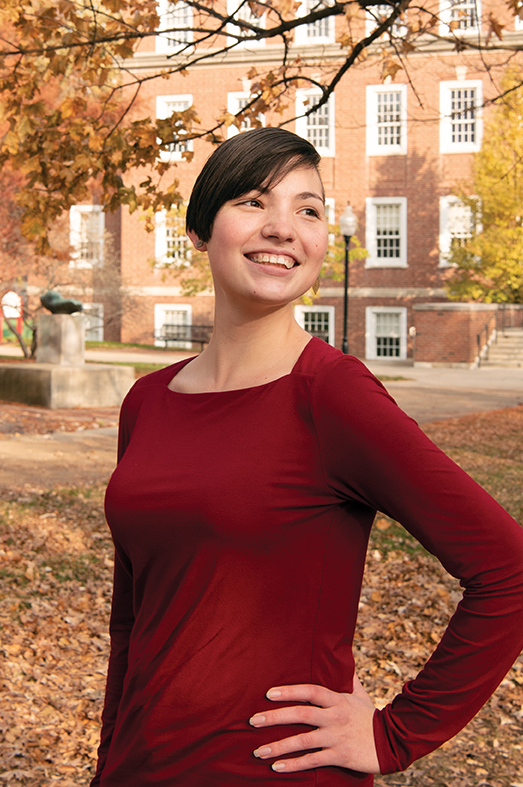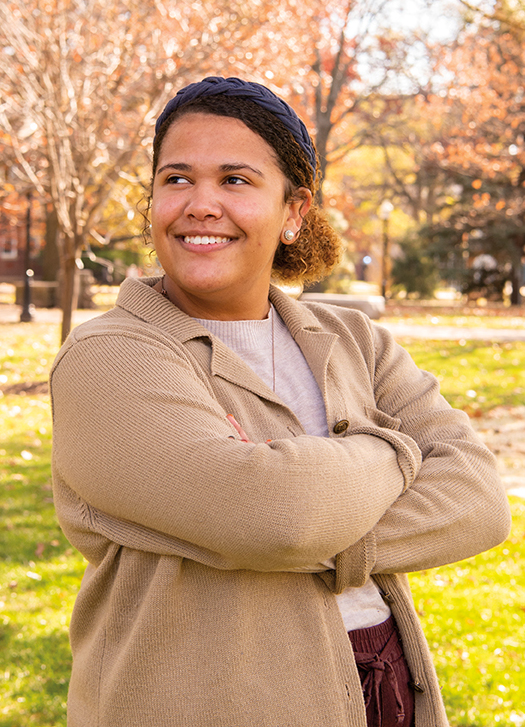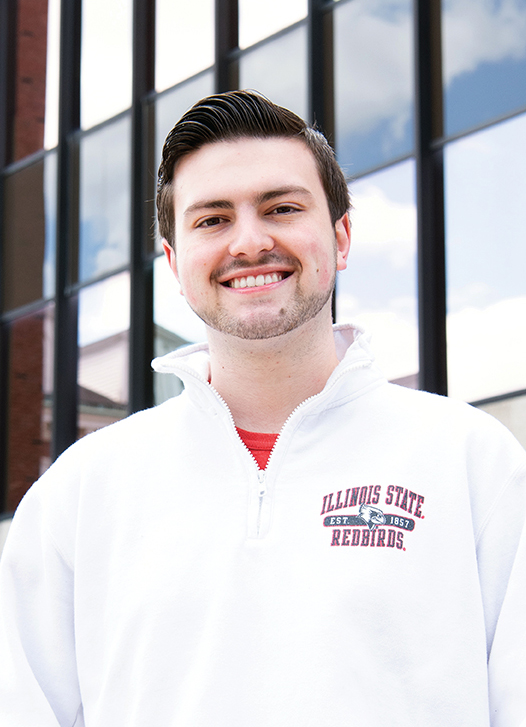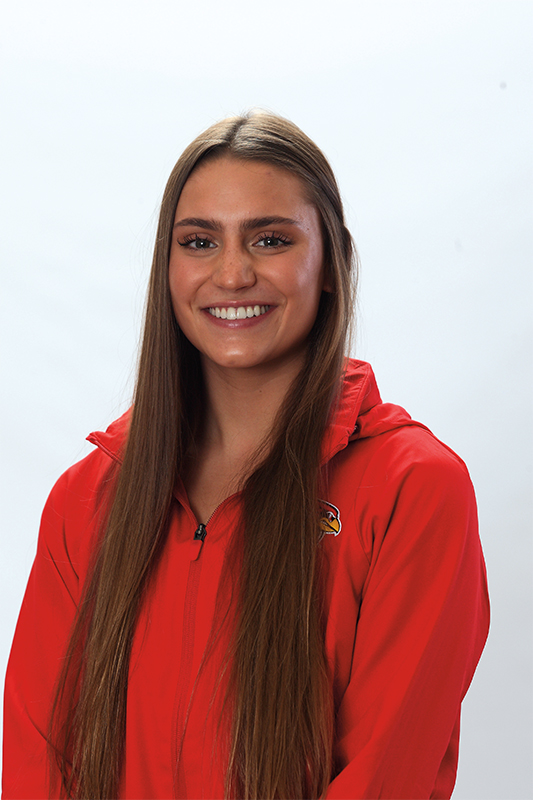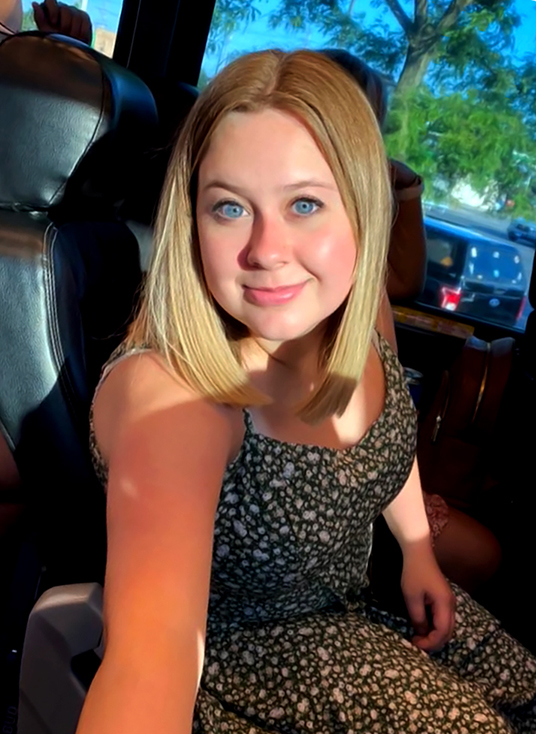
llinois State’s civic engagement and responsibility minor is for every student, as evidenced by the wide net it casts across campus. The 29 students enrolled this year represent five of the University’s six colleges and are being taught by faculty from four of those units.
“I’ve said this a million times, but whatever field you’re planning on going into these skills can be applied to it,” said Dylan Toth, a senior minoring in civic engagement and responsibility and majoring in family consumer sciences teacher education and political science. “And that’s why it’s called an interdisciplinary minor. It’s not a politics minor with a civic engagement concentration. It’s about being community minded; it’s about opening your mind to new ideas.”
That big-tent approach has been a part of the minor since it was established in 2007, as the first program of its kind in Illinois, under the auspices of the University’s American Democracy Project (ADP). ADP is an initiative of the American Association of State Colleges and Universities (AASCU) in partnership with The New York Times that supports higher education’s role in preparing informed and engaged citizens. The ADP committee, with leadership from Dr. Lance Lippert in the School of Communication, developed the “(Re)Design Your Course for Civic Engagement” workshop—in collaboration with the Center for Teaching, Learning, and Technology—to help faculty create courses
for the minor.
“I think there was a real interest in creating an interdisciplinary minor where students could connect theory and practice so that they can think about what they were learning in their classes and apply it in the real world,” said Center of Civic Engagement Director Dr. Katy Strzepek, Ph.D. ’18. “ISU has always had a strong connection to the American Democracy Project. This collaboration elevated interdisciplinary curricular and cocurricular opportunities related to civic learning and democratic engagement, which help students become better leaders and better practitioners of the values that they’re learning in the classroom and give them the chance to partner with communities.”
In 2020 the Center for Civic Engagement, which supports the University’s core value of civic engagement, incorporated the ADP and began overseeing the minor. University College Interim Director Wendi Whitman ’98, M.S. ’00, serves as the advisor for the minor. Strzepek and Harriett Steinbach, M.S. ’05, the center’s assistant director, now teach two of the program’s required courses, an introductory course and the capstone.
The program encourages students to not only engage in community service but also to critique its history and current practice. “We’ve talked a lot about that history of colonization and past harm and what we need to do to change this narrative and to be thoughtful and ethical partners,” Strzepek said.
Students must complete 21 credit hours composed of three core classes, including an internship, and four electives. The latter draws from courses in criminal justice sciences, communication, education, history, philosophy, political science, sociology, technology, and theatre. There is also an urban education focus open to teacher education majors.
In the capstone class, students must create a portfolio showing what they have done in the minor and more generally at Illinois State and examine how it ties to learning outcomes. “We want students when they leave ISU to be able to describe what they have learned and go into a job interview and say, ‘I was a civic engagement minor, and I learned how to talk about community problems with a diverse group of people and develop priorities. And I learned about ethics.’ And then be able to give a specific example of an assignment and also an experience,” Strzepek said.
Redbird Impact interviewed five Illinois State alumni and students about their experiences in the civic engagement and responsibility minor
Andrina Alvarado
The civic engagement and responsibility minor with the urban education focus has brought together Andrina Alvarado’s two passions: education and community involvement.
“I’ve always been really big into just helping out and giving back to the community,” said Alvarado, a senior majoring in secondary math education. “I’ve also been really interested in seeing a lot more community and school partnerships, so students being involved in the community and helping to solve and address community concerns but also in having communities becoming part of the school. It’s something I’ve always been passionate about.”
The minor gave Alvarado the opportunity to be part of such a partnership. Last summer, Alvarado did her internship with the Golden Apple organization at Kingsley Junior High School in Normal. There she worked with eighth-graders transitioning to high school. “I gained a lot of interesting experience. It’s definitely the most engaging experience I’ve had because I felt like I was part of the community there.”
Alvarado collaborated with Kingsley faculty to help students with math and their emotional well-being. “There were a lot of social-emotional needs that we were working to address because the pandemic changed the dynamics that we had. We worked really hard to address that and work with our students to get them to open up and be more comfortable with being in person and going to school and talking about the things that are going on in their lives.”
The minor has helped Alvarado prepare to be a better high school math teacher.
“I will want my students and I to be working toward dismantling and rebuilding systems that are broken but also incorporating mathematics into that,” she said. “Because one of the big questions you get is, ‘What am I going to use math for?’ And so, I think it is really helpful to them if I make the content relevant and also tie mathematics into the community and student interest in social awareness, political involvement, and just anything that students find themselves really passionate about.”
Olivia Streeter
The civic engagement and responsibility minor aligned with Olivia Streeter’s current interests and future plans.
“I chose civic engagement for a minor because I’m interested in working in public service or for a nonprofit,” said Streeter, a mass communications junior. “I thought having a minor like this would help me learn more about things like that and open some doors after graduation.”
Streeter enjoyed the introductory course led by Strzepek.
“I like that we talked about a lot of different social issues and the importance of different organizations in the Normal area and how they can provide help and service. I really enjoyed her class, and we had a lot of great discussions.”
Streeter said learning about civic engagement and how people can access resources in the community is important regardless of what career she pursues.
“The courses within this minor dive deep and give you the understanding that so many people lack and really look for, and that help them become more well-rounded citizens.”
Morgan Rosser
Dylan Toth
The minor with the urban education focus has expanded Dylan Toth’s understanding of what civic engagement encompasses.
“Being a political science major, I always thought it meant voting or going to town halls and talking to candidates or just staying politically engaged,” said Toth, who is an academic senator with the Student Government Association. “Civic engagement doesn’t have to be just for politics. It can be in whatever field that you’re in. I have found that just having a conversation about a difficult issue, mediating a conflict between two people, and being community minded and community focused—that’s being civically engaged.”
Toth, who plans to be a high school teacher, has gained a lot from taking part in the open discussions held in his civic engagement courses and learning how to communicate with people with different perspectives.
“One of the things that I really took from that class is the concept of a deliberative dialogue, just simply talking about an issue. As a teacher, that’s something I will absolutely use every single day.”
Toth served his civic engagement internship last summer with Common Cause Illinois, a nonpartisan government watchdog. Toth led campaigns; wrote op-eds and letters to the editor, the latter of which were published in the Chicago Tribune; and did a podcast.
“It was a program that was meant to help students become leaders in their community,” he said. “The point is everything affects you, and if you’re not at the table, you might be on the menu.”
Toth thought the internship and the minor taught him lessons he may not otherwise have learned and will help him with his future students.
“My personal philosophy is that education is the foundation of everything. If we raise a generation that is community minded and community engaged and open minded and understanding, we can really change the flow of our country.”
Morgan Rosser
The civic engagement and responsibility minor was the most memorable part of Morgan Rosser’s time at Illinois State.
“I looked at the requirements, and I was like, ‘Oh, a lot of these classes I’ve already done, and a lot of the others looked like classes that I was really interested in taking.’ So I applied, and I’m really happy that I did because I loved it,” said Rosser, who earned a bachelor’s degree last spring in organizational and leadership communication.
Rosser especially enjoyed the introductory and capstone courses. “The classes revolved around these awesome discussions with my classmates that allowed me to get a better understanding of other people’s perspectives on a lot of the things that we were learning about civic participation, engagement, and responsibility.”
Rosser applied some of those lessons when she helped organize social justice marches following the police murder of George Floyd.
“I got to basically bridge both of my degrees, my major, which was organizational leadership communication, and my minor, civic engagement and responsibility,” she said. “It was like a capstone for me to utilize all my skills from both sets of degrees.”
The minor also solidified her decision to get a law degree, which she is now pursuing at the University of St. Thomas in Minnesota. She did her internship for the minor with the McLean County State’s Attorney’s Office.
“It gave me a lot of great experience in the legal industry and translated over into the class nicely,” Rosser said.
Rosser recommended the minor to any student interested in civic engagement.
“It just gives you so much knowledge and information. The courses within this minor dive deep and give you the understanding that so many people lack and really look for, and that help them become more well-rounded citizens.”
Katie Sebok
Community service has been a part of Katie Sebok’s life from a young age. That continued at Illinois State where she participated in three Alternative Breaks service trips and through that program decided to minor in civic engagement and responsibility.
Her favorite part of the minor was creating the portfolio in the capstone course. “Harriett (Steinbach) told us to basically look at all the projects and all the papers that you’ve ever done at ISU and see how they can relate to civic engagement,” said Sebok, who graduated last spring with a bachelor’s degree in political science. “That was really cool looking back on things and relating that back to the minor.”
Sebok served her internship at the Center for Civic Engagement. Now she is creating a similar office at Heartland Community College as an AmeriCorps VISTA volunteer with Campus Compact. She credits the center and the minor for helping her decide how she wants to spend the rest of her life.
“I know that I love helping in the community. My current job is with AmeriCorps, and that’s because of (the minor). I just figured out this is what I am passionate about and this is what I want to do, and that is thanks to everybody within the program.”
For more about the Civic engagement and responsibility minor or to apply, visit
IllinoisState.edu/Academics/Civic-Engagement-Responsibility-Minor.
